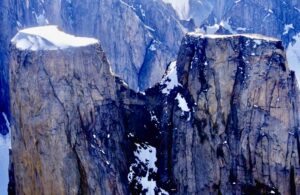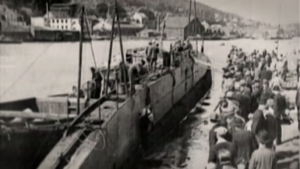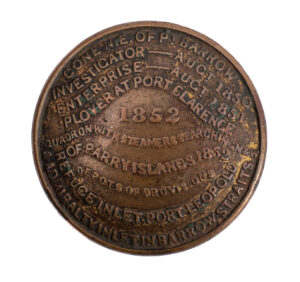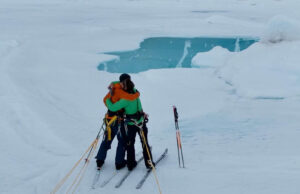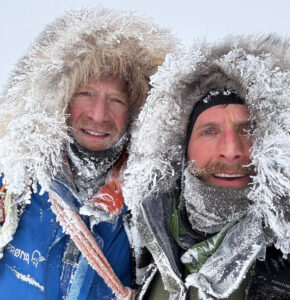Even after the early lockdowns lifted, severe travel restrictions aborted many adventures over the last two years. High-altitude climbing continued — sometimes disastrously — but arctic expeditions, in particular, all but stopped until this year. As an earlier story pointed out, non-essential outsiders couldn’t even visit Canada’s Nunavut territory for much of that time. The one notable expedition that did run managed to get an exemption by doing some science en route.
But as the sun returns to the Far North — it first peeked above the horizon in Grise Fiord, Canada’s northernmost community, on February 11 — the vibe suggests a slow return to normalcy. Arctic expeditions are happening. Others are waiting to see whether Russian entrepreneurs will build the floating ice station Barneo, near the North Pole, again this year. No one knows yet.
Barneo has not run since 2018. In 2019, a now-prescient dispute between Russia and Ukraine cause a last-minute cancellation. Then the pandemic in 2020-21. If the ice station does resurrect this year, expect not only Last-Degree tourist trips, North Pole marathons, etc. but possibly longer efforts that rely on Barneo for pickup.

After a long, dark winter, the sun finally returned to Grise Fiord on February 11. The 24-hour day begins on April 1, just six weeks after that first sunrise. Photo: Amon Akeeagok
In the meantime, here is a partial inventory of arctic journeys ongoing or upcoming. We’ll update the list as we get further news.

Charlie Walker lays it all out there. Photo: Charlie Walker
Lena River
Charlie Walker of the UK is currently in Yakutsk, in the coldest part of Siberia, about to trek 1,600km north along the frozen Lena River. We were wondering if Russia’s war on Ukraine would cause problems for a Western visitor, but he’s there now.

He took his first steps on the Lena’s frozen surface two days ago. In a few days, he will begin his long trek to Tiksi, population 5,000, on the Laptev Sea. He insists that it’s more than a physical feat: He wants to document the indigenous reindeer herders along the way.

Lena River. Photo: Charlie Walker

Pascale Marceau.
Qitdlarssuaq Returning Home
Pascale Marceau, the partner of veteran arctic traveler Lonnie Dupre, is anxiously watching satellite imagery these days. She hopes that the 1,200km manhauling journey she plans to do with partners Scott Cocks and Jayme Dittmar will come off. They want to ski from Greenland, down the east coast of Ellesmere Island, then across to Devon Island and Baffin Island. Their journey will end at the arctic town of Pond Inlet.
They want to enact the return route of the great Inuit shaman Qitdlarssuaq. He and his party reached Greenland from Baffin Island, stayed many years, and eventually decided to return. Qitdlarssuaq died early in the return trek, shortly after the crossing to Ellesmere Island. Marceau and party want to trace that theoretical return.

But whether they will even begin depends on whether the ice bridge forms between Canada and Greenland. As of February 23, it remained wide open. For hundreds of years, Greenland Inuit used this ice bridge every spring to cross to Canada to hunt muskoxen. But with climate change, its formation in recent years has been hit or miss. They also have a lot of open water to contend with further south as well.
Dupre will join them by dogteam on the Greenland side just as far as Rensselaer Bay, where they will wait for the right conditions to cross.
“If it doesn’t form at all… then, well we [will] have a very expensive holiday in Greenland,” Marceau said.

No ice bridge so far: Smith Sound, the traditional crossing point between Canada and Greenland, remained wide open on February 23.
Lake Baikal
Usually Lake Baikal hums at this time of year with trekkers hauling their sleds the 650km length of the world’s largest lake by volume. It’s become a good introduction to arctic sledding because of its moderate length, relative accessibility, and good hauling surface. But whether because of COVID’s long tail or Russia’s war on Ukraine, we know of only one independent party on Baikal so far: Lukasz Rybicki of Poland, whose drives a bus in London as his day job.
In 2020, Rybicki hoped to set a new speed record but he abandoned his crossing after 300km and six days on the ice. He had suffered a few injuries and fell into the water. Now in 2022, he is giving it another go. The record is about 10 days. Rybicki set off in mid-February dragging a 60kg sled.

Lukasz Rybicki before leaving. Photo: Lukasz Rybicki

